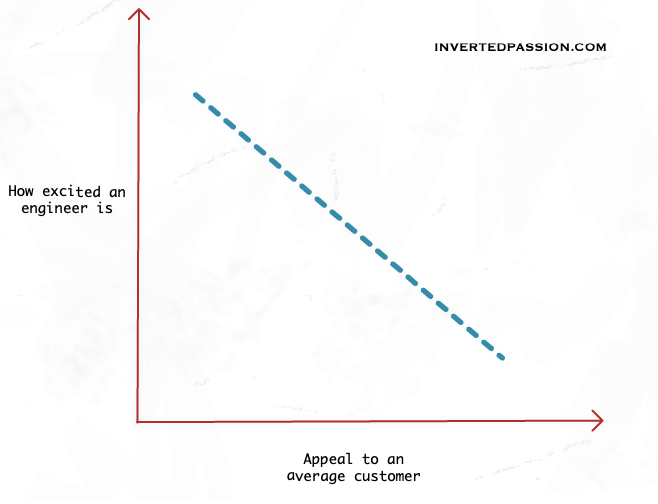There’s an inherent tension between how an engineer sees the product under development and how a potential user sees it. Engineers get excited by the technological advances and the number of options exposed in the gadget. A user sees all such complexity as overwhelming and off-putting.
It’s easy for a creator to forget that the user has a life to live and using their product isn’t a highlight of her life. Rather, it’s likely a chore.

People want their desires to be fulfilled in the most convenient manner. So, if someone wants to go from point A to point B, the most perfect solution would be instant teleportation and not starting the car and driving on the road. People care about their problems, and your solution is only an incidental means to solving those problems.
From an engineer’s point of view, internal combustion engines are fantastic – making a good engine requires knowledge and application of thermodynamics, acoustics, metals, and so on. But, for the busy user, it’s a hassle to get into a car, fiddle with the knobs, and then carefully drive to a destination. If the user can avoid all this effort, and get an additional hour of life not spent driving, she will switch from driving to teleportation in a jiffy. Everyone will.
While engineers get excited by how sophisticated technology they’re exposing in a product, potential users want none of it.
James P. Carse captures this perfectly in his book Finite and Infinite Games when he writes:
“We do not purchase an automobile, for example, merely to own some machinery. Indeed, it is not machinery we are buying at all, but what we can have by way of it: a means of rapidly carrying us from one location to another, an object of envy for others, protection from the weather. Similarly, a radio must cease to exist as equipment and become sound. A perfect radio will draw no attention to itself, will make it seem we are in the very presence of the source of its sounds. Neither do we watch a movie screen nor look at television. We look at what is on television, or in the movie, and become annoyed when the equipment intrudes–when the film is unfocused or the speakers hiss.”
James P. Carse in Finite and Infinite Games (emphasis mine)
Apple understands this principle deeply as evident from the design of the most successful tech product ever: the iPhone. When the iPhone was launched in 2007, they took great efforts to remove the stylus, which was the dominant mode of interaction with screens until then (and certainly a fascinating example of technology). Apple innovated on the user interface to make interacting with the iPhone’s screen as natural as flipping a magazine.
They knew that nobody wanted to use a phone. What people wanted was to call their friends, write emails and browse the Internet. To enable these use cases, they took the latest technology and abstracted away all the complexity from the user. Sure, they could have exposed the variety of configuration options to make the “full” use of iPhone’s underlying technology. But if they did that – like many other phone vendors at that time proudly used to do – they would have killed the iPhone.
Remember: a perfect radio is no radio. It’s just music.
This essay is part of my book on mental models for startup founders.
Join 200k followers
Follow @paraschopra